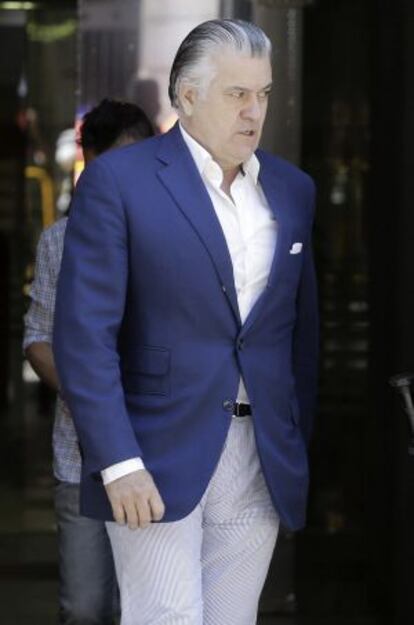PP’s illegal financing goes back to the days of its founding, says ex-treasurer
Luis Bárcenas tells court that all top party leaders knew about the structuring scheme


Former Popular Party (PP) treasurer Luis Bárcenas, who faces a string of money-laundering, tax-evasion and corruption charges, told the High Court on Thursday that the party had used illegal financing methods ever since it was first formed, under the name of the Popular Alliance (AP).
In court papers filed by his defense team, Bárcenas detailed how the different stages of structuring illegal contributions and donations worked inside the PP, and reiterated that top officials have always been aware of these methods.
After months of denials, Bárcenas admitted in June 2013 to High Court Judge Pablo Ruz that he kept secret ledgers related to a party slush fund, but he claimed that the accounts were not kept on his own initiative, as some PP leaders have publicly charged him with.
The orders came down from the current and past presidents and secretaries general of the party, reaching back to 1982 under the AP’s late founder Manuel Fraga, he said.
Judge Ruz has ordered him to stand trial along with Álvaro Lapuerta, his PP predecessor in a case related to the illegal financing investigation.
Bárcenas explained how he was ordered to liquidate ghost companies created to receive donations
Bárcenas claimed that he continued with the secret accounts until 2009, when the scandal broke following his implication in the Gürtel contracts-for-kickbacks corruption case. He is set to also go to trial in that case.
In January 2013, EL PAÍS published the Bárcenas ledgers, which record cash contributions and donations made by businessmen, and alleged bonus payments to top party officials.
After spending 19 months in preventive custody, he was released in January after posting a €200,000 bond when the judge determined that the Gürtel judicial investigation was over and set the trials to begin later this year.
The massive corruption ring was purportedly organized by a group of businessmen headed by Francisco Correa, who paid kickbacks to PP government officials in Madrid, Valencia and Castilla-La Mancha in exchange for contracts awarded between 1999 and 2005. Prosecutors are asking for a 42-year prison term for Bárcenas.
In explaining the alleged illegal party-financing scheme, Bárcenas detailed for Judge Ruz how he was ordered to liquidate ghost companies that were created to receive donations that were not permitted under the law. Ruz has ruled that the 20-year statute of limitations on those purported crimes has expired.
Under Fraga’s leadership in the AP, Bárcenas claimed, other companies, such as Sispa, Opisa, Hermógenes and Hernández Carretero were also created for a similar purpose. But these were dissolved by one of his predecessors, Ángel Sanchis.
From 1982 to 1986, Fraga personally received the contributions, which came at the time primarily from the nation’s largest chamber of business, the CEOE.
Bárcenas also accused former Prime Minister José María Aznar and former secretary general Francisco Álvarez Cascos of receiving donations from 1989 to 1990 at the PP.
Later, then-treasurer Rosendo Naseiro was put in charge of receiving the funds. But after Naseiro was facing charges of illegal party financing, he stepped down as treasurer in 1990 and Aznar appointed Miguel Blesa – the former Caja Madrid chairman who is currently facing investigations into fraud and mismanagement during his stint at the savings bank – to liquidate ghost companies that still existed.
Prime Minister Mariano Rajoy “received some important donations” between 2004 and 2008, says ex-treasurer
Throughout his writ, Bárcenas affirms that Aznar had nothing to do with administrating the donations after 1990. The money was then collected by the secretaries general of the party and in some cases, Álvaro Lapuerta, the other former treasurer who is facing charges along with Bárcenas.
However, Bárcenas does claim that Prime Minister Mariano Rajoy “received some important donations” between 2004 and 2008.
When Bárcenas took over from Lapuerta he “the donations from businessmen who had been helping the Popular Party had dropped considerably” from June 2008 to July 2009.
Tu suscripción se está usando en otro dispositivo
¿Quieres añadir otro usuario a tu suscripción?
Si continúas leyendo en este dispositivo, no se podrá leer en el otro.
FlechaTu suscripción se está usando en otro dispositivo y solo puedes acceder a EL PAÍS desde un dispositivo a la vez.
Si quieres compartir tu cuenta, cambia tu suscripción a la modalidad Premium, así podrás añadir otro usuario. Cada uno accederá con su propia cuenta de email, lo que os permitirá personalizar vuestra experiencia en EL PAÍS.
¿Tienes una suscripción de empresa? Accede aquí para contratar más cuentas.
En el caso de no saber quién está usando tu cuenta, te recomendamos cambiar tu contraseña aquí.
Si decides continuar compartiendo tu cuenta, este mensaje se mostrará en tu dispositivo y en el de la otra persona que está usando tu cuenta de forma indefinida, afectando a tu experiencia de lectura. Puedes consultar aquí los términos y condiciones de la suscripción digital.








































